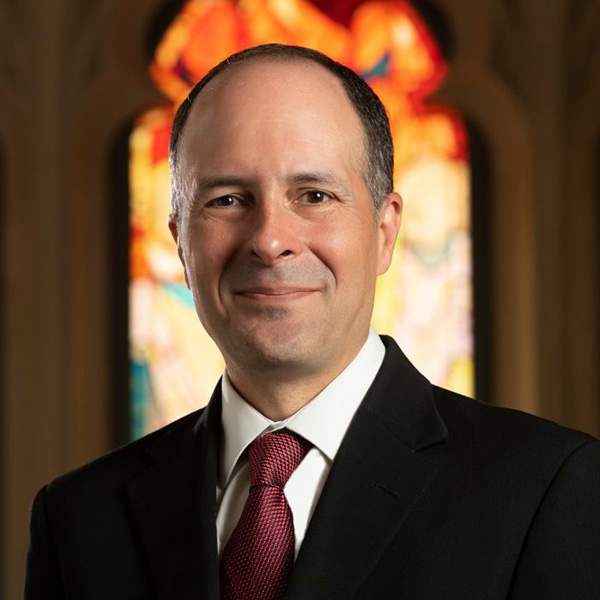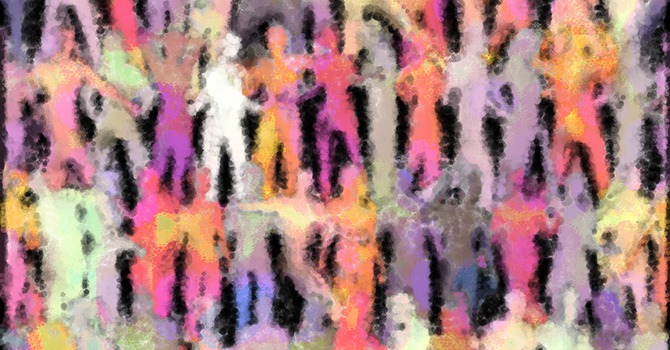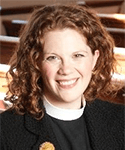Editor’s note: Faith & Leadership offers sermons that shed light on issues of Christian leadership. This sermon was preached May 30, 2004, at LaSalle Street Church in Chicago.
Stanley Hauerwas wrote that the church exists as a “story-formed community.” One of the big stories of the church is what we tell and celebrate today: Pentecost Sunday. The explosion of the Spirit of God. The story about how the Spirit of God took ordinary people and gave them power.
Our Scripture is a collection of stories about a particular group of people to whom particular events occurred. The events are rendered in a certain way, with certain things being emphasized and other events being left out. The stories of Scripture are told in such a way that they help us see the truth of what is going on around us. They uncover the essence, the truth about life. And in uncovering the truth, they help us to begin to tell and live our own lives truthfully.
The book of Acts is a story. It’s the story of God using ordinary people to create a new world through the power of the Spirit. What is portrayed in the book of Acts isn’t just a sober description of what is -- of a world dominated by Caesars, where enmity and selfishness and greed keep men and women estranged and fearful. Acts is a stubborn refusal to keep quiet and accept the world as unalterably given. It’s a story of people willing to be empowered, to be changed, where the ending is far from fixed, the outcome not predetermined. Instead there is always the notion, the thought that God is breaking through -- things can and will change as people respond to God’s interruption.
The words of Jesus [called] women and men to a new way of living and dying. The story of Acts is the story of how these ordinary people got on in this new life; how the words of Jesus became action.
These stories tell us how we can get on in this empowered life, or how we can miss it entirely.
The power of Pentecost begins by imagining life differently. There are two elements of Pentecost I want to point out about how we get on in this life of following Jesus. The first is that we have to begin to see God’s power differently, and the second is that we have to see change differently.
When the book of Acts opens, we find a group of followers who seem to have a sense of their limitations. They have come face to face with their inadequacies. Of the original 12, one betrayed the Lord to death; the other firebrand, Peter, let Jesus down at his arrest --presumably the rest of the disciples must have been somewhat demoralized by Peter’s failure at a crucial moment.
But all is not lost. They’ve encountered Jesus again. And they are obedient when they hear they are to “Go wait in Jerusalem…you will be baptized with the Holy Spirit not many days from now.”
Being baptized with the Holy Spirit had never happened before -- they had no reference point for imagining that. But it sure sounded…powerful! The disciples’ comment back to Jesus indicates [that the] last recorded words to Jesus on Earth -- before his ascension -- were: “Is this the time when you will restore the kingdom to Israel?”
Is this the time? We have wondered when you were going to really show your power. We thought it might be through a movement you led among us. We thought you might have given the call to action as you moved around Galilee. Then we thought maybe when you chased the money changers from the temple. We wondered when you were going to overturn Rome.
Is it now? Now in your risen form? Maybe it’s now that the fiery chariots will rush from heaven! Maybe it’s now that the Word of God will thunder from the mountains! Maybe it’s now that you will bring your kingdom (and us!) into grandeur!
And the wily answer Jesus gives -- the last recorded words -- is characteristically nuanced: “It’s not for you to know the times or periods that the Father has set by his own authority. But you will receive power when the Holy Spirit has come upon you, and you will be my witnesses… to the ends of the earth.”
The first thing the disciples needed to reimagine was what God’s power looked like in the world. They had to begin to see God’s power differently.
They saw that the thundering from the mountains, the fiery chariots, the cosmic power of God was going to come, but not in the old way they’d thought.
At Pentecost: the creative Spirit who brought abundance from nothingness; the one who whispered “freedom!” into the ears of a group of slaves in Egypt; the force that molded the shepherd boy David into the king of Israel -- that power came to the people. But it was power that was nuanced. Power that could be misinterpreted.
Even in this account where the narrative is so clear -- how can you miss it? -- [there are] violent winds, tongues of fire.
Even in this story there are bystanders, witnesses, who miss it. [Those] who witnessed the same event but saw nothing special or significant in it. “They are just drunk,” others said.
The story of Pentecost is the story of ordinary people receiving power. And one of the primary essences of the Spirit’s power in this passage is the power to reimagine. Not everyone will see that reality. Just because you or I can see it, doesn’t mean everyone else will see it and experience it as well. Our reawakened imagination will not be the dominant paradigm.
God’s power in this life is always nuanced.
But to those who open to it, this power changed them. And this is the second characteristic of Pentecost. They began to live like people who had no sense of their limitations. No sense of their restrictions. The apostles go from frightened to fearless. Peter goes from coward to courageous. And the unlikely becomes the norm.
A phrase that Peter quotes in this first sermon says provocatively, “In the last days, God declares that I will pour out my Spirit upon all flesh…your young men shall see visions and your old men shall dream dreams.
When do you hear old men dreaming dreams? Old men are the proverbial cynics, aren’t they? The “we’ve tried it before” wisdom. The “it can’t be done.”
What are old men doing dreaming dreams? Old men with their imagination and spirit animated and reinvigorated. Old men who are free to dream again. To imagine again.
The key characteristic biologists use to determine life is whether an organism is changing. The ability to modify and adapt is inherently part of living. But boy, that’s a hard concept for us to apply, isn’t it? We get in our well-worn houses of habit and instead of becoming a characteristic of life, change can become the threat we keep outside the door.
But the power of Spirit is to move Christ’s words into action. To move this story of Pentecost off the pages and into our lives. And that means change.
When was the last time you sensed the power of the Spirit to change you? Where do you need to look around and imagine your life -- your relationships, your mission -- differently?
Where do you see the power of the Sprit in your life?
For me the work of re-imagining begins where it did with the apostles, with re-imagining power -- and with re-imagining change.
I am guilty of looking for or desiring power -- God’s or my own in these kinds of big and great ways. I imagine human power as effecting large-scale change. God’s power swooping down to save in miraculous ways.
Since becoming a parent, I still imagine dominant power, but in much more modest ways. It’s the kind of power like I recall my parents had. Like the power to say, “Clean your room now!” and not feel that you are just expelling air. Most days, exercising that power is about as elusive as exercising the power of world domination.
When I was younger, power seemed something so vast and immense. And now, maybe it’s age, maybe age plus life-circumstance. But I imagine power differently. I’ve witnessed power differently. And I see change differently.
I’ve witnessed the power of phrases that once sounded just pithy to me. “A soft answer turns away wrath.” Sounds trite. But now I’ve witnessed the power of a soft answer. I’ve experienced the power of a firm, resolute and loving response and watched it diffuse all the blustering and violent words that had filled the air.
I have stood in awe of a widow’s power after burying her husband of 45 years. I’ve witnessed the power of faith that she holds when she chokes out the words, clings to, “Death is not the end.”
I have seen power at work in an alcoholic who gave up the very thing that's been allowing him to cope with life for years.
I see power differently now. Power doesn’t look like domination any more. Power seems to begin by imagining that a person can live differently. Think differently. Act differently. It’s an awakened imagination to live the words of Jesus Christ.
I’ve experienced the power of people believing in me when I didn’t believe in myself. Of being forgiven before I’ve even asked for forgiveness.
When was the last time you had a dream -- a hope -- for your relationships, for your neighborhood, that you were emboldened to act on?
The Spirit of Pentecost is not just for the early church. The Spirit wasn’t just to get the ball rolling and then to re-emerge at the close of time. The Spirit nudges and whispers and offers to blow new life into our words and decisions.
The year is half over. For many of us our lives are more than half over. What dreams do you have? Where do you sense God nudging, directing, hoping?
Some of you may remember “Dancing in the Dark,” a song by Bruce Springsteen: “Can't start a fire, worrying about your little world falling apart.”
Where is the Spirit asking you to stop defending and begin believing?














